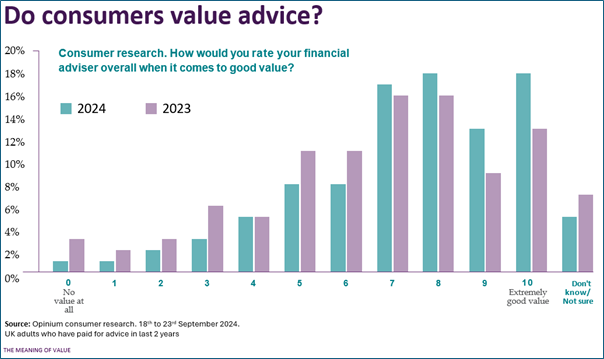Kia Ora. Mike here, easing you gently into another weekly Update.
Yesterday we launched the second annual “Meaning of Value” report, commissioned by Royal London. You can download a free copy of the report from the Royal London website. This is one of the more in-depth studies we undertake, combining both consumer and adviser views, and as always we are eternally grateful to the advisers who gave up their time to help with the research. Especially the ones who were unfortunate enough to end up speaking with me.
When the research was first launched 12 months ago, the intention was to shine a light on what consumers actually value when purchasing a financial product and/or paying for advice. As everyone knows, value is subjective and also contextual. Different people will ascribe different levels of value to different things. And most importantly it is only the consumer who can decide whether something is of value or not. You can help them make their mind up, but you can’t tell people what to think.
This time round whilst we still look at what people value, we wanted to give more focus to how satisfied they are with the products or services they are purchasing. This is the first step in building up a long-term data set that Royal London hope will become the benchmark for financial services when assessing value.
For the advice profession, these results are increasingly positive. The report contains a range of measures tracking overall value, satisfaction with advice, and a number of underlying metrics that consumers say are important to them. All of these show an increase from the 2023 study, with over two-thirds of people who are paying for advice sitting in the 7 to 10 range for overall value. A strong endorsement for the advice profession.

We deliberately use the word profession to describe the advice sector, because that is what it is. Those of us who are old enough to remember the pre-RDR days will tell you just how transformational the last decade has been, and this sort of research is intended to help champion this fact. Any profession should always be focused on delivering good outcomes, and part of that will be embedding a desire to continuously improve. As such, the research also contains a few areas where advisers could focus on.
Firstly, whilst overall satisfaction with advice is improving, the age 55 and above cohort is slightly below the average. The figures are still good, but considering the importance of this age cohort to most advice firms it is one to keep an eye on.
Secondly, the question of investment performance and how that relates to overall value. 24% of advisers say it has a big impact on consumer perception, whereas 45% of consumers say it is the most important thing to them. This rises to 50% for males but is less of an issue for females (38%). One adviser we spoke with as part of this research talked about needing to make sure the right conversations happen at the right time in the client lifecycle. They spend more time talking about investment performance (and how it can’t be directly controlled) up front and in the first client review meetings. It then hopefully becomes less of an issue as the client buys into the wider financial planning process, but you still need to remember that the clients want to make money.
Finally, the question of fees. The research shows some evolution on advice firm fee models, with the use of fixed and/or capped models becoming more popular. On the consumer side, when we asked consumers to rank on a scale of 1-10 whether they understood the fees they are paying we can see a reasonably healthy average of 7.3. We ask further questions about fees, including whether they are happy with the level of fees they are paying (yes, they are), but I wonder whether this is another area we might see some improvement this time next year. Maybe my simplistic brain, but understanding fees is a crucial part of assessing value (cost is what you pay, value is what you get….) so ideally this should be scoring closer to 10 out of 10.
But as I said, these areas of improvement are almost at the level of nit-picking. The overall levels of satisfaction from consumers who are paying for advice have improved year on year from what was already a decent base. Advice is increasingly of value, and those who are fortunate enough to benefit from it are increasingly very happy with the outcomes they are receiving. These results are built on a hard-earned bond of trust between advisers and consumers that has taken 12 years post-RDR to really come through. The imminent work to review the Advice/Guidance Boundary, potentially offering new versions of “advice” needs to ensure this level of trust isn’t broken.
And to close, New Zealand’s finest (IYKYK), Joe Dukie with one of the best voices on the planet….





